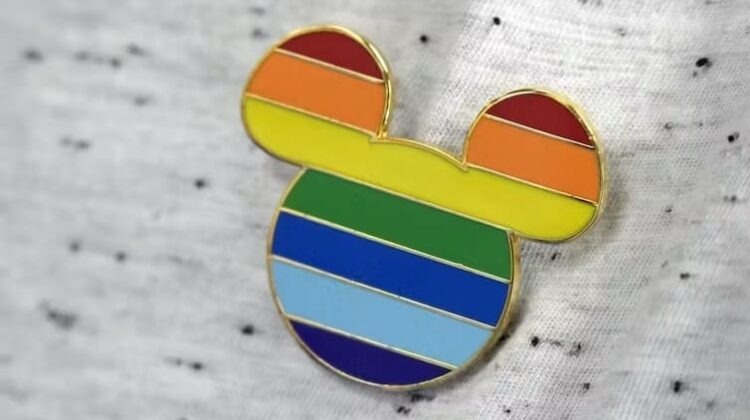
Progressives’ embrace of Disney in battle with DeSantis over LGBTQ rights comes with risks
Is Disney really a ‘woke’ corporation? AP Photo/Phelan M. Ebenhack
Steven Gerencser, Indiana University
The battle between The Walt Disney Co. and Florida Gov. Ron DeSantis over LGBTQ rights and whether those rights should be acknowledged – let alone taught – in schools has spurred an unlikely alliance between progressives and one of the world’s biggest entertainment companies.
Progressive groups such as The Human Rights Campaign have welcomed Disney to their cause, while progressive columnists at The Daily Beast and MSNBC have cheered Disney’s recent lawsuit against DeSantis. The suit, filed in April 2023, alleges that DeSantis violated the company’s free speech rights by retaliating against Disney for opposing a Florida education law that would prevent teachers from instructing early grades on LGBTQ issues.
DeSantis has decried Disney as a “woke” company and sought to punish the media conglomerate by stripping the company of its powers to control development in and around Disney World in Orlando.
While joining forces with corporations to achieve political ends can be advantageous, given their tremendous resources, it also poses risks for progressives, who may suffer setbacks when their principles no longer align with corporate profits. Just look at how quickly Bud Light backed away from a transgender social media influencer promoting the beer when conservatives threatened boycotts and sales slipped. Before the backlash, a top marketing executive had said the brand needed to become more inclusive; afterward Bud Light said it would focus marketing on sports and music.
I am a professor of political science who studies corporate political rights and the role corporations play in the public square. Disney v. DeSantis raises questions of how advocates of free speech and democracy should approach a situation when a corporation joins their side.
Power to persuade
Business interests have long tried to influence public policy, even before the landmark Supreme Court decision Citizens United v. FEC lifted restrictions on corporate spending on elections. Corporations spend billions of dollars each year to lobby Congress and billions more lobbying state legislators. They finance think tanks and foundations that promote their views and interests. They place “advertorials” in local newspapers’ op-ed pages.
Citizens United, decided in 2010, cemented corporations’ right to participate in politics. The high court ruled that political spending amounts to protected speech, and governments cannot infringe on corporations’ right to free speech by limiting the money companies can spend to influence voters through advertising and other means.
Progressives have blasted the decision for unleashing torrents of corporate cash that they say is corrupting the political system.
Ironically – at least for progressives – Disney’s lawsuit against DeSantis is based in part on Citizens United and the free speech rights it established for corporations. In the statement that caused trouble with DeSantis, Disney showed itself a reasonable partner for advocates of LGBTQ rights.
The statement went beyond just criticizing the legislation. Disney vowed to help overturn the law, which critics derided as “Don’t say gay.”
“Our goal as a company is for this law to be repealed by the legislature or struck down in the courts,” the company said in the statement. “We remain committed to supporting the national and state organizations working to achieve that.”
Disney has since demonstrated its willingness to use its resources and power to take on DeSantis over the issue of LGBTQ rights, including filing the lawsuit, which centers on Disney’s advocacy against the Florida law. In May, Disney canceled a US$1 billion office project in Orlando that would have brought an estimated 2,000 jobs to Florida.
These actions show the extraordinary resources that corporations can bring to bear in support of political causes, and progressives have welcomed these resources in advancing their issues. For example, many progressives supported Major League Baseball when it moved its 2021 All-Star Game from Atlanta to protest Georgia’s restrictive voting laws and lauded two Atlanta-based companies, Coca-Cola and Delta Air Lines, for their support of MLB.

Politics and profits
But progressives’ efforts to harness the powers of global companies come with risks.
Corporations’ loyalties tend to lie with profits and shareholders, and the political principles that companies embrace may get quickly discarded when profits are threatened. The Vanguard Group’s retreat from the Net Zero Asset Managers initiative to reduce carbon emissions when it felt pressure from investors reveals this vulnerability.
Political alliances, of course, can shift as circumstances change. Sen. Lindsey Graham, Republican of South Carolina, branded candidate Donald Trump as a “race-baiting, xenophobic, religious bigot” in 2015 but became one of the former president’s staunchest supporters following Trump’s election in 2016.
Corporations are not unlike other players in the political sphere. As the previous examples show, most groups or people – whether businesses, advocates or political leaders – will pursue their own interests and adjust their positions to achieve them.
But because corporations are market-oriented, they can be even more inconsistent allies than is usually the case with politicians, parties and interest groups.
Target Corp., for example, altered some displays and merchandise promoting Pride month – the annual celebration of the LGBTQ community – after a backlash from some customers.
The graver danger comes if corporations take actions or positions inimical to those of their allies and turn corporate power and resources to positions contrary to the groups with which they are momentarily aligned. Thus, conservatives were staggered to learn that Chick-fil-A, a reliable supporter of conservative causes, hired a vice president of diversity, equity and inclusion. They even threatened to boycott the fast-food restaurant chain.
Progressives would be naive to reject the power and influence of corporations when their interests intersect, as they have in Disney v. DeSantis. They would be just as naive to assume that corporations would consistently support a cause or treat employees, customers or the communities in which they operate with fairness because of laudable positions on public policies.
Corporate interests – including profits, share prices, customer bases and employee relations – are the primary drivers of business decisions, not a commitment to the range of progressive issues from racial diversity to LGBTQ rights to climate change that critics deride as “wokeness.” So, while DeSantis and other conservatives may sound alarms about Disney and the rise of the “woke” corporation, in reality there may be no such thing.
Steven Gerencser, Professor of Political Science, Indiana University
This article is republished from The Conversation under a Creative Commons license. Read the original article.
